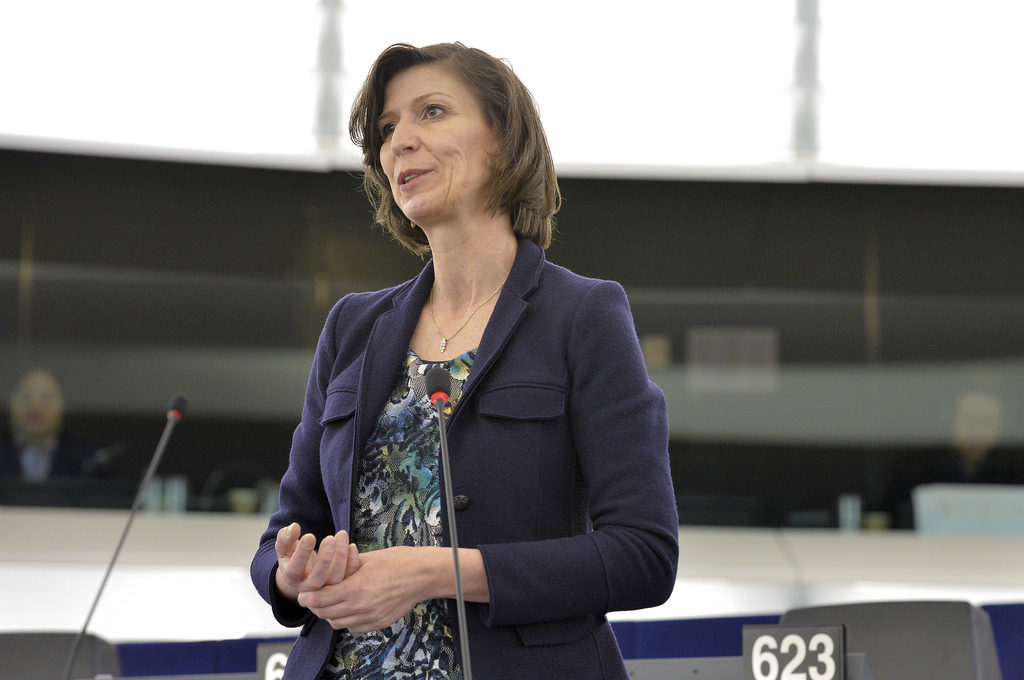Successo per il Partito per gli Animali nel Parlamento Europeo: pesticidi pericolosi devono essere ritirati subito dal mercato
The European Commission must with immediate effect ensure that hazardous, carcinogenic pesticides will no longer be permitted on the European market and that their use will be prohibited. The Commission was ordered to do so thanks to two proposals of the Party for the Animals in the European Parliament. With this the Party has contributed to a stricter new pesticides act.

Party for the Animals Member of the European Parliament Anja Hazekamp
Research by the food watch dog Foodwatch has recently shown that the European Commission has systematically extended the approval for large numbers of risky pesticides. These extensions were blindly granted without re-evaluating the risks of the substances. This means that European agriculturists and horticulturists are using pesticides which are harmful to people, animals, and the environment.
It was already laid down in the European law in 2015 that five of these pesticides are too dangerous to be used. However, their admission was also extended without being reassessed. Those pesticides are, for example, used for the production of apples, pears, cherries and strawberries, and have been linked to fertility problems and endocrine disruptions with people.
Party for the Animals Member of the European Parliament Anja Hazekamp immediately questioned the European Commission on the result of the Foodwatch research. Last week, she succeeded in enforcing a moratorium on the use of all hazardous pesticides and to stop the automatic extensions of outdated approvals for hazardous pesticides.
Hazekamp: “It is a great victory that the European Parliament finally realises that action should be taken. These substances do not belong in our food. The Commission has the obligation to ensure that only substances are approved which are not harmful to people, animals, and the environment. The European Ombudsman already concluded that the Commission is way too soft, resulting in many substances being on the market while they should not be. This is finally going to end.”
Concerns about animal testing, but no action
Hazekamp has also submitted two proposals concerning the use of animal testing for pesticides. One of those proposals was adopted by the European Parliament: this shows that the parliament is concerned with the fact that the use of animals for testing in respect of hazard identification and risk assessment does not comply with the requirements of the 3 Rs (replacement, reduction and refinement) of the EU Directive 2010/63 concerning animal testing.
However, the parliament’s concerns were obviously not great enough: Hazekamp’s proposal requiring a ban on animal testing in all research and assessment procedures for pesticides was not adopted.
La Commissione Europea deve immediatamente fare in modo da non consentire i pesticidi dannosi e carcinogenici sul mercato Europeo e che il suo utilizzo venga vietato. Questa istruzione e’ stata data alla Commissione dal Parlamento Europeo grazie a due proposte del Partito per gli Animali. In questo modo il partito ha contribuito ad una nuova legge piu’ severa sui pesticidi.

Europarlamentare Anja Hazekamp del Partito per gli Animali
L’autorita’ alimentare Foodwatch ha pubblicato l’esito di una loro ricerca recente rivelando che la Commissione Europea ha approvato in modo consistente tanti pesticidi rischiosi. Queste approvazioni sono state rilasciate automaticamente senza nessuna rivalutazione dei rischi delle relative sostanze. Questo significa che i contadini ed agricoltori Europei utilizzano decine di pesticidi che sono pericolosi per l’uomo, l’animale e l’ambiente.
Gia’ cinque di questi cosidetti pesticidi sono stati specificati nella legga Europea del 2015 poiche’ siano troppo pericolosi da utilizzare. Ma anche il loro accesso al mercato e’ quindi stato approvato senza ulteriore rivalutazioni. Queste sostanze vengono usate ad esempio nell’agricoltura delle mele, pere, ciliege e fragole e sono state associate con problemi di fertilita’ e disturbi ormonali nell’uomo.
L’Europarlamentare per il Partito per gli Animali Anja Hazekamp ha subito fatto delle domande alla Commissione Europea in seguito alla ricerca di Foodwatch. La settimana scorsa e’ riuscita anche a spingere un moratorio per l’utilizzo di tutti i pesticidi pericolosi e fermare le estensioni automatiche delle approvazioni datate di pesticidi dannosi.
Hazekamp: e’ una bellissima vittoria che il Parlamento Europeo capisce ora che bisogna agire. Queste sostanze non appartengono nel nostro cibo. La Commissione ha il dovere di approvare solo le sostanze che non siano dannose per l’uomo, l’animale a l’ambiente. L’Ombudsman Europeo ha gia’ concluso che la Commissione e’ troppo lassa, portando alla presenza di molte sostanze sul mercato ingiustamente. Finalmente finira’ questa pratica.”
Preoccupazioni sulle sperimentazioni sugli animali, ma nessun intervento
Hazekamp ha fatto anche due proposte relative all’utilizzo delle sperimentazioni con gli animali per i pesticidi. Una di queste proposte e’ stata accettata dal Parlamento Europeo: cosi’ il parlamento dimostra le sue preoccupazioni sul fatto che l’utilizzo di animali per le sperimentazioni per identificare i pericoli e valutare i rischi non sia in linea con i requisiti dei tre pilastri delle linee guide Europee sulle sperimentazioni con gli animali 210/63/EU; Sostituzione, Riduzione e Perfezionamento.
Ma si vede che il parlamento non si preoccupava abbastanza: la proposta di Hazekamp che richiedeva un divieto sulle sperimentazioni in tutte le valutazioni e investigazioni per i pesticidi, non e’ stata accettata.